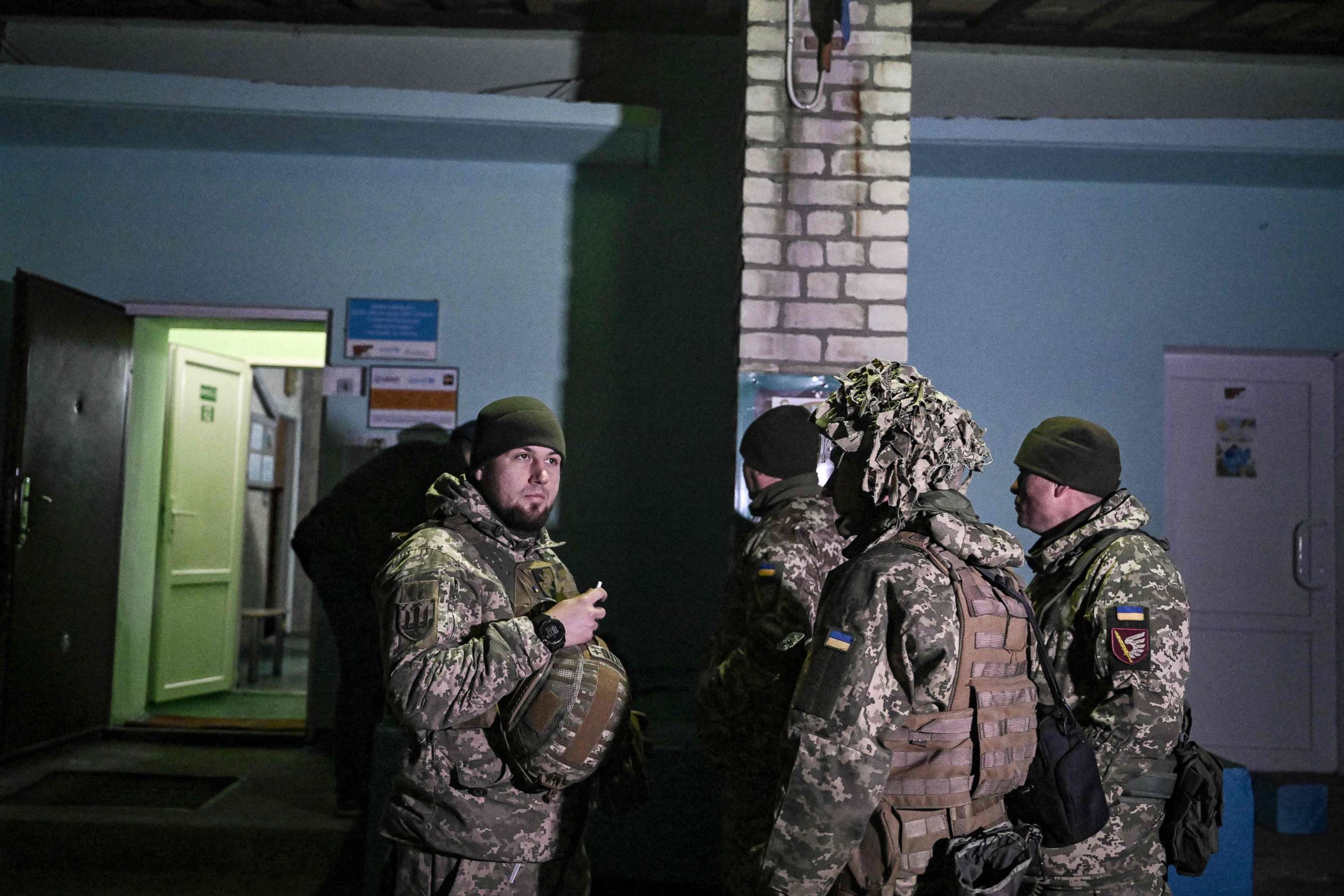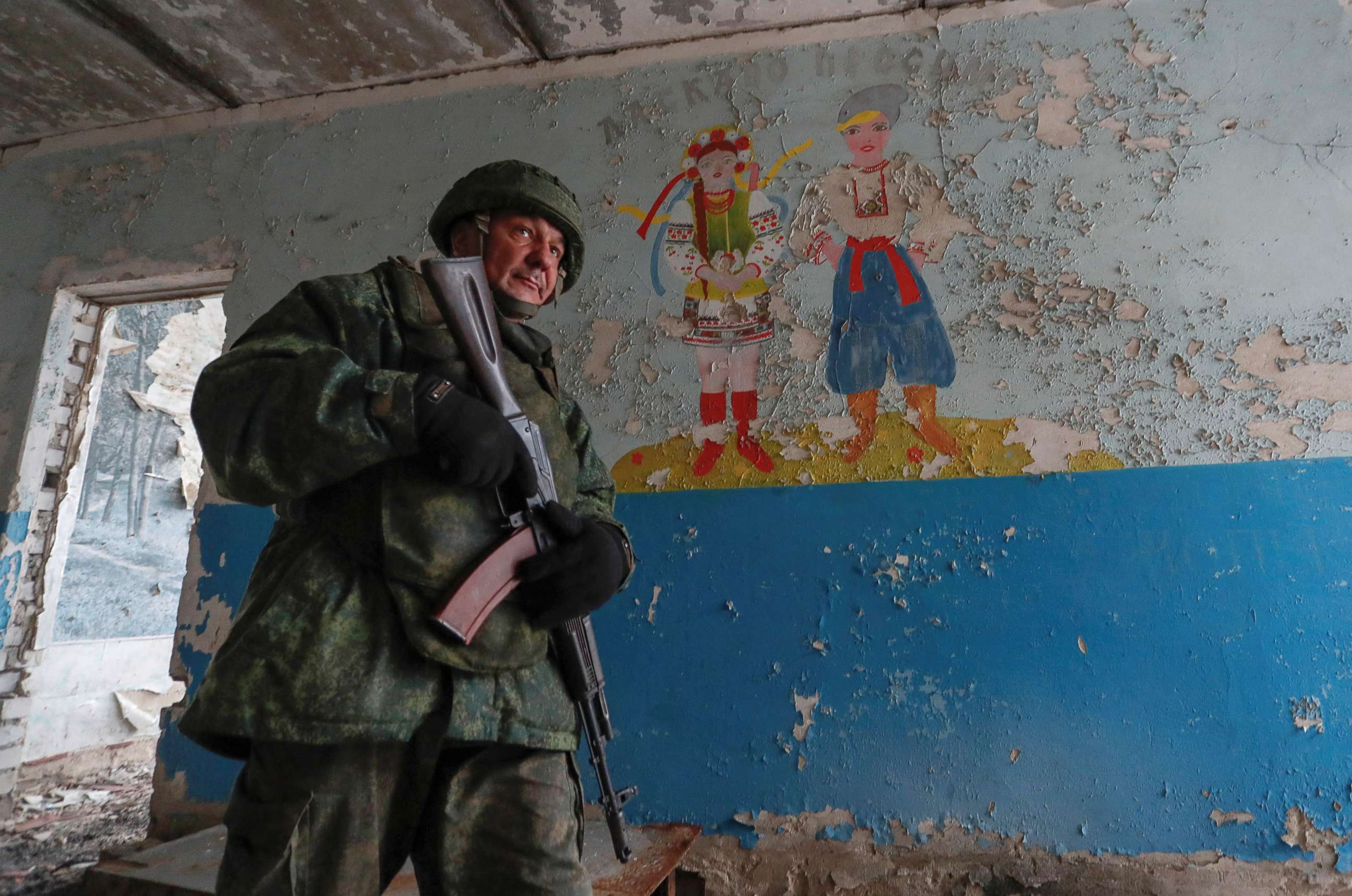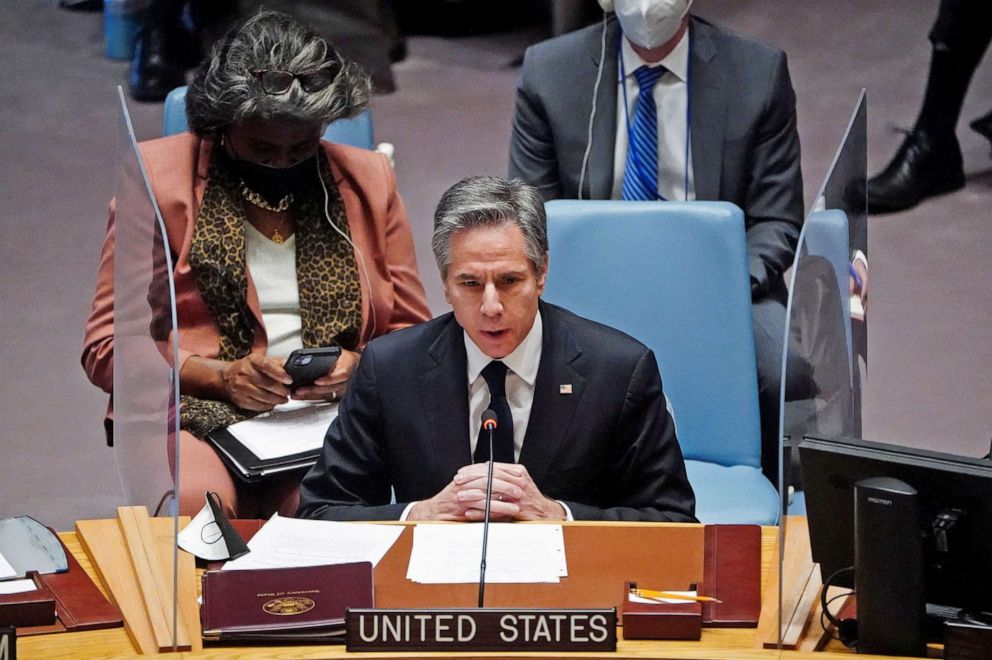Tensions rise in Ukraine as Russian-backed separatist shelling hits nursery school
President Joe Biden said he expects Russia to invade.
LVIV, Ukraine -- Tensions have jumped in eastern Ukraine as Russian-controlled separatists there shelled a nursery in Ukrainian government-held territory and warned of escalation, amid concerns that Russia may be looking to build a pretext to launch an invasion.
Mortar rounds fired by the separatists struck kindergarten number 21 in the village of Stanytsa Luhansk on Thursday morning close to the frontline with Ukrainian troops, injuring three adults, according to Ukraine’s military. Video filmed by Ukrainian soldiers showed a hole blown in the school’s wall. Twenty children had to be evacuated but were unhurt, Ukraine’s armed forces said.
Ukraine President Volodymyr Zelenskyy accused the Russian-backed separatists of “provocative shelling” and as the United States warned Russia is now preparing to launch an invasion in the coming days. President Joe Biden on Thursday told reporters “every indicator we have is they’re prepared to go into Ukraine, and “we have reason to believe they are engaged in a false flag operation to have an excuse to go in."
NATO Secretary General Jens Stoltenberg also said he was concerned Russia “is trying to stage a pretext for an armed attack against Ukraine.”
The firing occurred at the same time as the Russian-controlled separatists accused Ukraine of “large-scale” shelling onto their territory and warned of a “substantial worsening” of the situation along the front line.
The self-declared Peoples Republics of Donetsk and Luhansk on Thursday issued “emergency statements” claiming Ukrainian troops had fired onto civilian areas in nine villages, including with heavy caliber mortars. Rodion Miroshnik, a political advisor for the Lugansk ‘republic’, accused Ukraine of ordering a “massive provocation.”

The two unrecognized statelets control part of Ukraine’s Donbas regions, after Russia helped create them during fighting in 2014 and they remain heavily dependent on Moscow and its troops, which are covertly stationed there.
For weeks, the separatist leadership and Russian state media have accused Ukraine of preparing to mount an offensive against the separatist territories. Western officials and independent experts worry Russia may be laying the groundwork for a pretext it could use to justify a military intervention should it choose to attack.
This week, Russia opened a war crimes investigation into separatist claims to have found mass graves, supposedly containing the victims of alleged Ukrainian atrocities. Russian President Vladimir Putin told a press conference on Tuesday “genocide” was taking place in eastern Ukraine.
At least 14,000 people have died during the eight-year conflict in Ukraine, many of the victims died following indiscriminate artillery fire by both sides. However, no evidence has emerged of large-scale massacres or genocide as Russia claims.

Late Wednesday night, Russia's mission to the United Nations circulated a document that alleged Ukraine had committed large-scale war crimes in the eastern regions ahead of a U.N. Security Council session on the war.
U.S. Secretary of State Anthony Blinken in the U.N. council session Thursday accused Russia of planning to manufacture a pretext for an imminent invasion of Ukraine, singling out the mass grave claims and saying Moscow might also stage phony drone strikes or chemical or biological weapons attacks.
Russia might try to claim such an event as “ethnic cleansing or a genocide.” Blinken said. He said that would make a “mockery of a concept that we in this chamber do not take lightly.”
“Nor do I take lightly, based on my family history,” said Blinken, a reference to his stepfather who survived the Holocaust.
Blinken said the U.S.’ information now indicates that Russia’s build up of forces near Ukraine means they “are preparing to launch an attack against Ukraine in the coming days.”

He warned that after spreading false claims about a Ukrainian attack on the separatist, Russia might convene high-level emergency meeting to address them, after which it would launch an assault. Blinken said the Russian plan would see aerial bombardment across Ukraine, backed up by massive cyberattacks, as Russian tanks and troops moved on cities, including the capital Kyiv.
"Here today, we are laying it out in great detail with a hope that by sharing what we know with the world, we can influence Russia to abandon the path of war and choose a different path while there's still time," Blinken said.
Russian officials have dismissed the U.S. accusations as “hysteria” and pointed out that a date announced for the possible Russian attack this week, Feb. 16, had passed without anything materializing.
"We have long ago clarified everything and explained everything, and the announced date of the so-called invasion is behind us, so therefore, my advice to you is not present yourself in an awkward situation," Russia’s Deputy Foreign Minister Sergey Vershinin told Blinken during the UN council meeting.
The Feb. 16 was reported as a possible day for a Russian attack after U.S. officials privately briefed NATO allies last week, but U.S. officials have said the reason they identified it was because of information Putin has ordered his military to be ready to go from that date.
Russia’s parliament earlier this week passed a law appealing to Putin to recognize the separatist regions as independent from Ukraine. The step would be a major escalation, opening the path for Russia to formally annex them as it did Crimea in 2014.
But Putin so far has signaled he will not act on the appeal, saying on Tuesday that Russia will continue to work through the so-called Minsk agreements. The 2015 peace deal aimed at end the conflict in eastern Ukraine. Russia recognizing the self-declared republics would amount to it exiting the Minsk deal.
Russia’s military this week has claimed to be moving some of its forces back from near Ukraine and its Defense Ministry on Thursday insisted again some troops were now returning to base. A spokesman said, the first units from Russia’s western and southern military districts, had already reached their home bases far from the border and more were moving there now.
But NATO countries and Ukraine, as well as independent analysts, have said so far there is no evidence of Russia is withdrawing substantial forces and that in reality it is continuing its build up.
Huge Russian exercises are continuing in neighboring Belarus and the Black Sea, scheduled to go on until Feb. 20, after which Russia has said its forces will leave. A Russian deputy foreign minister on Thursday said it was time for western countries “to calm down,” saying the exercises would soon end.
ABC News' Conor Finnegan contributed to this report.




